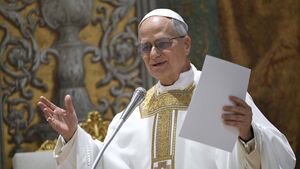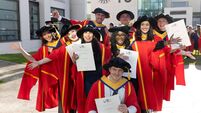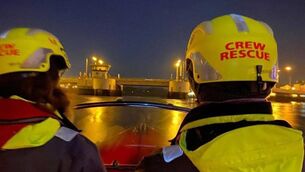Fr Liam Power: The election of Pope Leo XIV -continuing the precious legacy of Pope Francis

Addressing the College of Cardinals after his election, Pope Leo XIV proclaimed that his own pontificate would be a continuation of the “precious legacy of Pope Francis”. Photo: Simone Risoluti - Vatican Media
I was surprised that there was such media interest in the election of the new pope. With images of white smoke billowing from the chimney in the Sistine Chapel flashing across the world, there was a palpable sense of hope and rejoicing: surely indicating that the world appreciates the spiritual and moral leadership, which is the gift that the papacy can bring to the world.
Parishioners have recounted how spiritually uplifting it was for them.
The new pope, Cardinal Robert Prevost, chose the name Leo XIV. He said he chose the name Leo as he was inspired by Pope Leo XIII, who in 1891 issued the first social encyclical of the Church that was viewed as a charter for workers.
Subtitled, “On the Conditions of Labour”, it was a cry of protest against the exploitation of poor workers.
It committed the Catholic Church to a rejection of the central thesis of liberal capitalism, namely that labour is a commodity to be bought at a market price, determined by the law of supply and demand rather than the human needs of the worker.
Pope Leo XIII protested against the misery and wretchedness pressing so unjustly on the majority of the working class.
“A small number of rich people have been able to lay upon the teeming masses of the labouring poor a yoke little better than that of slavery itself.”
The encyclical goes on to champion the right of workers to a just wage, to enable them to live with dignity.
It also recognised the right of workers to organise themselves and to join trade unions so as to protect themselves from exploitation.
Leo XIII addressed the social question of his day in the context of the great industrial revolution.
Faithful to this great tradition, Pope Leo XIV feels the Church should respond to another industrial revolution brought about by the developments in technology, particularly in the field of artificial intelligence, that pose new challenges to the defence of human dignity, justice and labour. But Cardinal Prevost has always sided with the poor.
Bess Twiston Davies has written about his ministry in Peru. As bishop in the diocese of Chiclayo, his area was particularly impacted by the Covid pandemic. He organised and coordinated a series of life-saving initiatives in collaboration with local authorities, coordinating relief and mobilising solidarity.
The people remember him for being there, for being unafraid to visit them and show them his closeness at a time of fear and loss.
He is credited with opening emergency shelters near the shores of the Pacific Ocean for destitute families fleeing persecution in Venezuela. He coordinated the support efforts bringing together relief agencies, such as the St Vincent de Paul but above all he was there on the street reaching out to destitute families.
He founded pastoral ministries for health, for prisoners, for the environment.
When a cyclone struck in the area in 2023, “Bishop Prevost could be seen wading through the water in his wellington boots, distributing bags of food.”
This was the lifestyle of a man totally committed to the poor and marginalised, a man, who having graduated in mathematics from Villanova University in Pennsylvania, was offered a place in Harvard Law School but opted instead to join the Augustinian Order and dedicate his life to serve Christ in the poor and downtrodden of the earth.
And now he is called to serve as leader not just for the 1.4 billion Catholic Christians in the world but to serve as spiritual and moral leader to a world where power, greed, and violence corrupt the moral order.
He will serve by calling to account leaders and political movements whose policies undermine human dignity, resulting in war and genocide.
As Cardinal, Pope Leo has already challenged Vice President JD Vance on immigration policy in the US. Vance claimed that Christian teaching advocates for prioritising love first for family, then neighbours, community, fellow citizens and lastly the world.
The Cardinal Prevost stated boldly, “JD Vance is wrong. Jesus does not ask us to rank our love for others.”
Addressing the College of Cardinals after his election, Pope Leo proclaimed that his own pontificate would be a continuation of the “precious legacy of Pope Francis”.
In particular, he emphasised missionary outreach in loving care for the least and rejected, and to embed the synodal process more fully in all aspects of ecclesial polity.
He wants the Church to move from an experience where authority speaks and it's all over, to “an experience that values the charisms, gifts, and ministries that are in the Church”.
He wants to revive the practice of the early Church whereby the people had a say in the selection of bishops. He would like to have more synodal structures in dioceses, which would allow bishops to hear from their people.
“Every diocese needs to have a pastoral council.”
In his opening statement to the world, Pope Leo called for peace at least four times.
"Weapons can and must be silenced, for they do not resolve problems but only increase them.”
He has offered to mediate disputes in global wars. I am hopeful that he will succeed.






